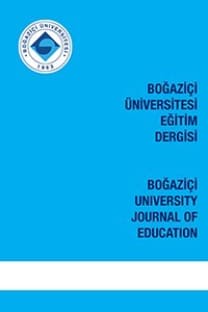İngilizce’nin Yabancı Dil Olarak Öğretiminde Anadili İngilizce Olan ve Olmayan Öğretmenlerin Rolü
Öz
Dünyada İngilizce’nin öğretimi, anadili İngilizce olan ve olmayanlar olarak iki temel grup öğretmen
tarafından yapılmaktadır. Her iki grup öğretmenin farklı bağlamlarda, farklı alanlarda güçlü yönleri
olmasına rağmen, anadili İngilizce olan öğretmenlerin dili daha iyi öğretebildikleri biçiminde bilimsel
dayanağı olmayan yaygın bir kanı bulunmaktadır. Bu kanı, anadili İngilizce olmayan öğretmenlerin işe
alımlarda haksızlığa ve genel olarak ayrımcılığa uğraması ile sonuçlanabilmektedir. Bu yazıda bu ayrımın
gittikçe önemsiz hale gelmeye başlamasının nedenleri, Türkiye bağlamında yerli öğretmenlerin güçlü yönleri
ve bir İngilizce öğretmeninin dili iyi bilmekle birlikte gerekli yöntem ve alan bilgisine sahip olması gerektiği
anlatılmaktadır.
Anahtar Kelimeler:
Anadili İngilizce olan öğretmenler, anadili İngilizce olmayan öğretmenler, yabancı dil öğretmeni eğitimi, öğrenci tutumları, öğretmen yeterlikleri
İngilizce’nin Yabancı Dil Olarak Öğretiminde Anadili İngilizce Olan ve Olmayan Öğretmenlerin Rolü
___
- Alptekin, C. (2010). Redefining multicompetence for bilingualism and ELF. International Journal of Applied Linguistics, 20, 95110.
- Benke, E., & Medgyes, P. (2005). Differences in teaching behavior between native and non-native speaker teachers: As seen by the learners. E. Llurda (Haz.), Non-native language teachers: Perceptions, challenges, and contributions to the profession (s. 195215). New York: Springer.
- Braine, G., & Moussu, L. (2006). The attitudes of ESL students towards nonnative English language teachers, TESL Reporter, 39(1), 3347.
- Bruthiaux, P. (2010). World Englishes and the classroom: An EFL perspective. TESOL Quarterly, 44, 365369.
- Canagarajah, A. S. (Haz.) (2005). Reclaiming the local in language policy and practice. Mahwah, NJ: Lawrence Erlbaum.
- Cheung, Y. L. (2002). The attitude of university students in Hong Kong towards native and non-native teachers of English. Yayınlanmamış yüksek lisans tezi. The Chinese University of Hong Kong, Hong Kong, SAR, China.
- Cook, V. J. (1991) The poverty-of-the-stimulus argument and multicompetence. Second Language Research, 7, 103–117.
- Cook, V. J. (1999). Going beyond the native speaker in language teaching. TESOL Quarterly, 33, 185–210.
- Cook, V. J. (2005). Basing teaching on the L2 user. E. Llurda (Haz.), Non-native language teachers: Perceptions, challenges, and contributions to the profession (s. 47–61). New York: Springer.
- Crystal, D. (2002). English in the New World. Babylonia, 1(2), 16–17.
- Crystal, D. (2003). English as a global language (2. basım). Cambridge: Cambridge University Press.
- Edge, J. (1988). Natives, speakers, and models. Japan Association of Language Teachers Journal, 9, 153–157.
- Graddol, D. (2006). English next. http://www.britishcouncil.org/learning-research-english-next.pdf adresinden alınmıştır.
- Holliday, A. (2008). Standards of English and politics of inclusion. Language Teaching, 41,119–130.
- House, J. (1999). Misunderstanding in intercultural communication: interactions in English as a lingua franca and the myth of mutual intelligibility. C. Gnutzmann (Haz.), Teaching and learning English as a global language (s. 73–89). Tübingen: Stauffenburg.
- Kachru, B. B. (1985). Standards, codification and sociolinguistic realism: The English language in the outer circle. R. Quirk & H. Widdowson (Haz.), English in the world: Teaching and learning the language and literatures (s. 11–36). Cambridge: Cambridge University Press.
- Lasagabaster, D., & Sierra, J. M. (2005). What do students think about the pros and cons of having a native speaker teacher? E. Llurda (Haz.), Non-native language teachers: Perceptions, challenges and contributions to the profession (s. 217241). New York: Springer.
- Llurda, E. (2004). Non-native-speaker teachers and English as an International Language. International Journal of Applied Linguistics, 14, 314–323.
- Llurda, E. (Haz.) (2005). Non-native language teachers: Perceptions, challenges, and contributions to the profession. New York: Springer.
- Mahboob, A. (2003). Status of non-native English-speaking teachers in the United States. Yayınlanmamış doktora tezi. Indiana University, Bloomington.
- Medgyes, P. (1994). The non-native teacher. Hong Kong: MacMillan.
- Moussu, L. (2002). English as a second language students’ reactions to non-native English speaking teachers. Yayınlanmamış yüksek lisans tezi. Brigham Young University, Provo, UT. (ERIC Document Reproduction Service No. ED 468 879).
- Moussu, L. (2010). Influence of teacher-contact time and other variables on ESL students’attitudes towards native-and non-native-English-speaking teachers. TESOL Quarterly, 44, 746–768.
- Pacek, D. (2005). ‘Personality not nationality’: Foreign students’ perceptions of a non- native speaker lecturer of English at a British university. E. Llurda (Haz.), Non-native language teachers: Perceptions, challenges and contributions to the profession (s. 243−262). New York: Springer.
- Paikeday, T. (1985). The native speaker is dead! Toronto: Paikeday Publishing.
- Phillipson, R. (1992). Linguistic imperialism. Oxford, UK: Oxford University Press.
- Rampton, M. B. H. (1990). Displacing the ‘native speaker’: Expertise, affiliation, and inheritance. ELT Journal, 44, 97–101.
- Seidlhofer, B. (2001). Closing a conceptual gap: the case for a description of English as a lingua franca. International Journal of Applied Linguistics, 11, 133–58.
- Tatar, S., & Yıldız, S. (2010). Empowering nonnative-English speaking teachers in the classroom. A. Mahboob (Haz.), The NNEST lens: Non native English speakers in TESOL (s. 114−128). Newcastle upon Tyne: Cambridge Scholars Publishing.
- ISSN: 1300-9567
- Yayın Aralığı: Yılda 2 Sayı
- Başlangıç: 1976
- Yayıncı: Boğaziçi Üniversitesi
Sayıdaki Diğer Makaleler
Profesyonel Bir Meslek Olarak Türkiye’de Öğretmenlik
Öğretmen Eğitimi Üzerine Düşünceler
Öğretmenin Bilgisi Özel bir Bilgi midir? Öğretmek için Gereken Bilgiye Kuramsal bir Bakış
İngilizce’nin Yabancı Dil Olarak Öğretiminde Anadili İngilizce Olan ve Olmayan Öğretmenlerin Rolü
Bir Matematik Öğretmeni Ne Bilmeli? Alan Bilgisi ve Alan Eğitimi Bilgisi Arasındaki Fark
